…when they are Holding On Upside Down!
Which is the title of scholar Linda Leavell’s new biography on the poet Marianne Moore. This past April, I corresponded with Dr. Leavell concerning a curious object which is displayed in Marianne Moore’s living room on the 3rd floor of the Rosenbach Museum. In the far corner of the room hanging above the door frame is a bar secured by two chains. There was a debate amongst our volunteers as to the purpose of this unusual object; was it proper to refer to it as Ms. Moore’s trapeze, or was it her chin-up bar? Dr. Leavell directed me to several letters in the Moore archive which refer to her use of a trapeze bar. Moore first writes to her brother about hanging from her trapeze in 1911 as a means of straightening her spine. Moore suffered from scoliosis (a curvature of the spine) from early adolescence
until the end of her life. After a graduating from Bryn Mawr College, Moore spent a summer working at Melvil Dewy’s Lake Placid Club and health resort. It is here when she possibly encountered Dr. Willard who advised her to try various exercises and hanging upside
down to straighten her spine. Dr. Leavell wrote:
I titled my book, “Holding On Upside Down”
because of the phrase in her poem “Poetry,” but it’s also true that
she did hang upside down!Copies of Hanging On Upside Down are on sale in the Rosenbach’s shop. You can have your copy signed on November 13th at 6:00 pm when author Dr.Linda Leavell will speak at the Rosenbach. For more information and to RSVP click here.
…when they cannot sing!
In 1964, Randall Jarrell’s book The Bat-Poet with pictures by Maurice Sendak was voted the best illustrated children’s book by the New York Times. The Rosenbach has Marianne Moore’s copy of the book. On the final page Moore carefully notes page numbers and selected quotes from the text. Moore coresponded with both Jarrell and the illustrator Maurice Sendak.
The Bat-Poet is the story of a little brown bat who can’t sleep during the day-he keeps waking
up and looking at the world. Before long he begins to see things
differently from the other bats, who from dawn to sunset never opened
their eyes. He
ponders the coarse song of the mockingbird and wonders if he could sing
too. He finds that he cannot do very well with the song, but feels
drawn toward the creation of the words for songs. In this way he becomes a poet. As a poet he strives to make the other bats see the world his way.

